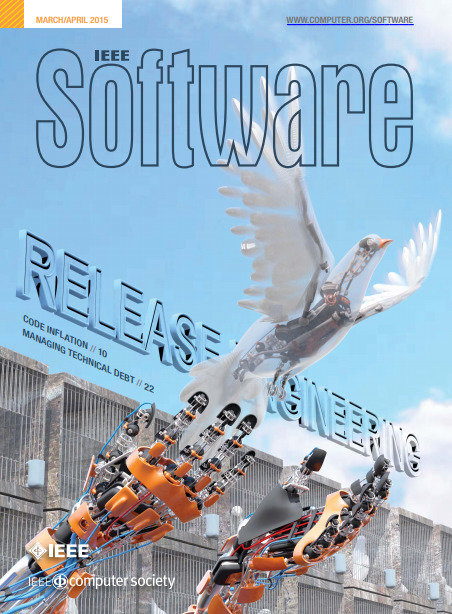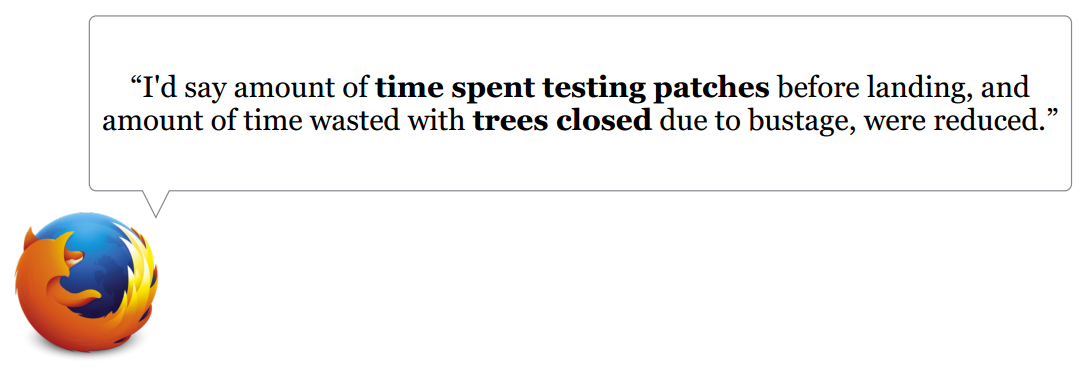Move fast and break things?

The impact of rapid releases on the rejection of software changes
Rodrigo Souza
<rodrigo@dcc.ufba.br>

Title Text
Subtitle

Salvador, Bahia, Brazil
Assistant Professor at the
Federal University of Bahia


Research interests
- Empirical software engineering
- Mining software repositories
- Release engineering
- Software quality

This talk
- Rejected changes
- issue/bug reopening
- supplementary changes
- negative code reviews
- Rapid releases
- Facebook's early motto:
"Move fast and break things" - Mozilla: 6-week releases
- Facebook's early motto:
- Are changes more likely to be rejected when we move faster?

Rejected changes

Software changes
- Software has to change
- Not all changes are created equal
- Good enough :)
- Inappropriate :(
Undetected
Bugs are shipped to users!
Detected
Rejection
Rework

- the review is negative
- the commit is reverted
- the issue is reopened
- supplementary change
- re-testing
- (i.e., rework)
Inappropriate changes
(the earlier, the better)
Inappropriate changes
how to detect them from existing repos?
how much rework do them cause?
are they more likely under rapid releases?
Data: Mozilla Foundation
- Main projects:
- Firefox
- Core (reusable code)
- Mercurial (commits) and
Bugzilla (issues/bugs) - All non-trivial code is reviewed
- All inappropriate commits are reverted
- Closed issues may be reopened




Inappropriate changes
how to detect them from existing repos?
- negative code reviews
- reverted commits
- supplementary commits
- reopened issues


Negative code reviews
- Very early rejection
- Problems in the code
- coding style
- design
- performance
- potential bugs
- Not all projects perform reviews on all changes


Reverted commits
- A commit that reverts a previous commit
- In Mercurial, revert = "backout"
- Can be early or late in the process
- Rejection due to problems found during automated or manual testing
- Very few projects actually revert commits

changeset: 0a93ae68184e summary: Bug 787078 - Backout 43dd8252f52d
Supplementary commits
- 2+ commits for the same issue
- Can be early or late in the process
- Not always a sign of problems
- Multipart commits
- Easily detectable

changeset: 0a93ae68184e summary: Bug 1635 - add info button changeset: 394bf8a8e9fa summary: Bug 1635 - fix button behavior
Issue reopening
- Problem found after issue was closed
- Late in the process
- Not always because of problems in the change itself
- Tester used the wrong version
- Issue was prematurely closed
(e.g., duplicate, wontfix)
- In some projects, a new issue is created



supplementary commits
reverted commits

Core

supplementary commits
reverted commits
Part 1: ... Part 2: ...

Core

reopened issues
commits reverted after issue is closed

Core
Inappropriate changes
how much rework do them cause?
rejected changes

negative reviews
reverted commits
reopened issues
21%
12%
8%
5%
(among changes associated with issues, reviews, and commits)


Core
5 rejections
per day
1 rejection
per day
How often are changes rejected?
Inappropriate changes
are they more likely under rapid releases?
Rapid Releases

Release approach
Feature-based
Time-based
Traditional releases
Rapid releases
(short cycles)
Rapid releases
and quality
Frequent delivery => more feedback
Tighter deadlines => less time for testing
Rapid releases
and time pressure
Hurry to ship a feature in the next release
"If I don't ship now, I can ship in a few weeks"
vs.
Traditional
Before March 2011
12+ months btw releases
Rapid
After March 2011
6 weeks btw releases

Transition to rapid releases
- Annoying update notifications!
- My extensions are broken!
- My company needs stability!

(users' viewpoint)
What about rejections?

issues w/ reverted commits
the rejection rate is increasing!
... or is it?


.
.
.
Early vs late rejections

early reverts
problems are detected earlier
late reverts
You have to understand the process
main branch
pull
push
automated build:
wait for build...
or
(broken)
revert and push
Before
main branch
pull
push
revert and push
After
staging branch

build sheriff
merge


Conclusions
- Naïve conclusion: with rapid releases...
- developers are breaking the system more often
- hence, they perform more rework
- After talking to developers: with rapid releases...
- they perform less testing before pushing changes
- the main branch is rarely broken
- For users:
- late rejections decreased (fewer bugs are shipped)
- updates arrive frequently
- corporate users have extended support releases

References
R. SOUZA. Inappropriate Software Changes: Rejection and Rework (PhD Thesis)
http://rodrigorgs.github.io/files/rodrigo-thesis-final.pdf
SOUZA, R. ; CHAVEZ, C. ; BITTENCOURT, R. A.
Rapid Releases and Patch Backouts: A Software Analytics Approach
In: Software, IEEE, 2015.
http://online.qmags.com/ISW0315#pg91&mode2
Other related publications
http://rodrigorgs.github.io/publications
Move fast and break things?

The impact of rapid releases on the rejection of software changes
Rodrigo Souza
<rodrigo@dcc.ufba.br>
(extra slides)
Before
- All changes were pulled from and pushed to one single branch
- Each change triggered a build (compile + test), which lasted ~ 4h
- A broken build affected all developers
- The developers was responsible for reverting his/her commit
After
- Automated builds are still run and are still slow
- Changes are pulled from the main branch and pushed to a staging branch
- Upon a succesful build, sheriffs merge the two branches
- Upon a broken build, sheriffs revert the offending commits
Broad questions
- How to detect inappropriate changes before they reach end users?
- How to avoid creating inappropriate changes in the first place?
- what are the characteristics of changes that end up being rejected?
- what characteristics of the process lead to increased rejection?
Move fast and break things? The impact of rapid releases on the rejection of software changes
By Rodrigo Rocha Gomes e Souza
Move fast and break things? The impact of rapid releases on the rejection of software changes
Software has to change to remain useful; some changes, however, end up being rejected for being incomplete or buggy, resulting in rework. With many projects moving to a rapid release model, the question arises: with the faster pace, do developers write code less carefully, resulting in more rejected changes? This talk presents an investigation on this topic through the analysis of issue reports and commit logs from Mozilla Firefox and related projects.
- 657



